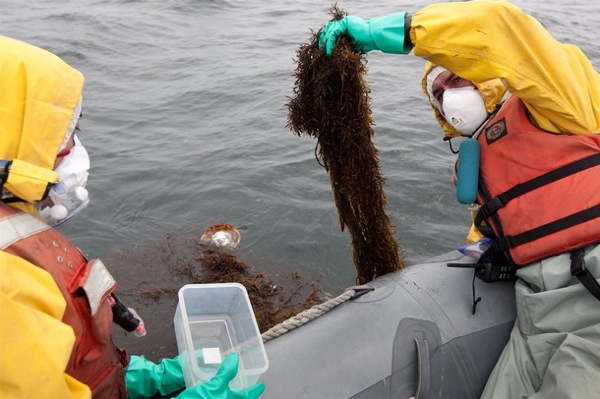The Fukushima meltdown was always worse than thought
Posted by Big Gav in brave new climate, fukushima, japan, nuclear power
SP at TOD ANZ has a look at the failure of the nuclear power zealots at "Brave New Climate" to provide accurate or unbiased commentary when looking at the Fukushima disaster - Fukushima was always worse than thought.
While a prominent Australian based pro nuclear site went in hard and fast (prematurely) extolling the safety of the Fukushima Daiichi nuclear reactor and its operators; decrying any popular press report of dangers as alarmist, two months on a clearer picture begins to emerge.
Several themes were proposed about the failure in the face of the massive earthquake that struck the Tohoku region. But one, which increased in height with time, was that no one could have foreseen the danger presented by the Tsunami. This has now been revealed as false. It was foreseen; TEPCO was warned. ...
Through out the early phase of the disaster BNC continued to claim that no damage had occurred to the containment. Many fancy annotated pictures (the site loves them) with big arrows were posted. In fact investigators are now conducting an inquiry reassessing the time-line of events and now believe that the reactor containment may have been damaged by the earthquake. This is not totally surprising given the size of the earthquake.It also explains the later leaks. ...
Much is made of the "defense in depth" strategy adopted by nuclear power plants. But defense in depth surely means more than just repeating the same (potentially flawed) subsystem over and over. Two examples. Almost all of the diesel generators were located in the basement. Mainichi Daily termed this a "lack of diversity".
Alexis Madrigal at The Atlantic has an article noting how successful the PR blitz was at hiding the truth during the first 2 months of the disaster - "One of the Japanese nuclear reactors experienced a total meltdown, but we're only finding out two months after the accident" - Meanwhile, the Disaster at Fukushima Continues.
The No. 1 nuclear reactor at Fukushima Daiichi melted down in the first day after the massive quake and tsunami cut power to the plant, the Tokyo Electric Power Company admitted Sunday.
As Nature News' Geoff Brumfiel reports, workers went into the unit recently "to recalibrate some of the sensors on the reactor." Much to their surprise and dismay, they found that the core experienced a total meltdown. The zirconium alloy tubes that hold the uranium fuel pellets during normal operation all warped and the uranium is now lying at the bottom of the pressure vessel, or possibly even outside of it in the basement below or outside the concrete containment building. With all the fuel piled up at the bottom, there is some danger that the nuclear reaction could have restarted. As of now, engineers on the scene aren't sure what happened.
The revelation that the reactor experienced a total meltdown doesn't change the situation at Fukushima that much. The temperatures inside the reactor now appear to be low enough that whatever happened to the fuel is not continuing. The same cooling and cleanup operations must happen.
But what the information does highlight is that when a nuclear reactor gets damaged, the people in charge have to make a lot of decisions with imperfect information. The scary thing about a nuclear disaster like this is that here we are two months later and new (and very important) news about what happened is still coming out.
The same thing actually happened at Three Mile Island, where eight months after the accident, an Oak Ridge National Laboratory scientist declared, "Little, if any, fuel melting occurred, even though the reactor core was uncovered. The safety systems functioned reliably." A few years later, robotic sorties into the area revealed that half the core -- not "little, if any" -- had melted down.
When I wrote about Three Mile Island and the data problems they had back in 2009, I hoped that better sensors and great computing power might make it easier to understand a nuclear disaster as it happened. As more information has emerged from Japan, it's clear that no matter how many drones and computer models we throw at a nuclear meltdown, it can still defy our capacity to understand it in real time. And that unknowability has to be incorporated into how we evaluate the risk of nuclear power disasters.
The WSJ has a look at a number of the failures that occurs on the first day after the earthquake - Fukushima Daiichi Diary: Other Problems.
A Wall Street Journal examination of the first 24 hours after the Fukushima Daiichi accident shows that disaster piled on disaster, worsening the nuclear crisis faster than anyone had initially thought could happen. Here's a more detailed look at some of the other problems that the stricken plant, regulators and operator Tokyo Electric Power Co. were grappling with.






